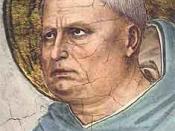Freedom of Will
Questions and doubts are the basic factors that determine men's critical thinking about life. Throughout human history, different cultures and societies have yielded to varying approaches to explain such issues, as predictability of events involving natural forces and individual's fate. Religions developed as the common result of such dilemmas. In particular, Christianity provided people with the concept of a "Master Plan" (or fate) determining a continuous intervention and presence of God in human lives. Christianity perceives the issue of Freedom of Will as a dogma, explicated only through a theological statement: even though "Universal prescience" is an attribute of Deity, men can benefit of absolute freedom and both aspects coexist as a "superior concept," which is unperceivable through rational means.
According to Christian belief every individual has a fate, which leads him/her through predetermined life events. Nevertheless, it is possible that a person has the ability to exercise freedom of his/her will.
The doctrine that God has created man, has commanded him to obey the moral law, and has promised to reward or punish him for observance or violation of this law, made the reality of "moral liberty" an issue of transcendent importance. Unless man is really free, he cannot be justly held responsible for his actions, any more than for the date of his birth or the color of his eyes. All alike are inexorably predetermined for him. Moreover, the difficulty of the question was augmented still further by the Christian dogma of the "fall of man" and his redemption by grace, which many theologians postulated as the "Divine Answer" to such dilemma.
Among the early Fathers of the Church, St. Augustine stands pre-eminent in his handling of this subject. He emphasizes very strongly the absolute rule of God over men's wills by His omnipotence and...



Nicely Done
This did what it needed for me: It got my mind turning and helped to put my thoughts in order on freedom of will and such. I'm doing a paper on Civil Peace, and i'm sure this will help greatly in the response section of my paper. Thanks.
2 out of 2 people found this comment useful.